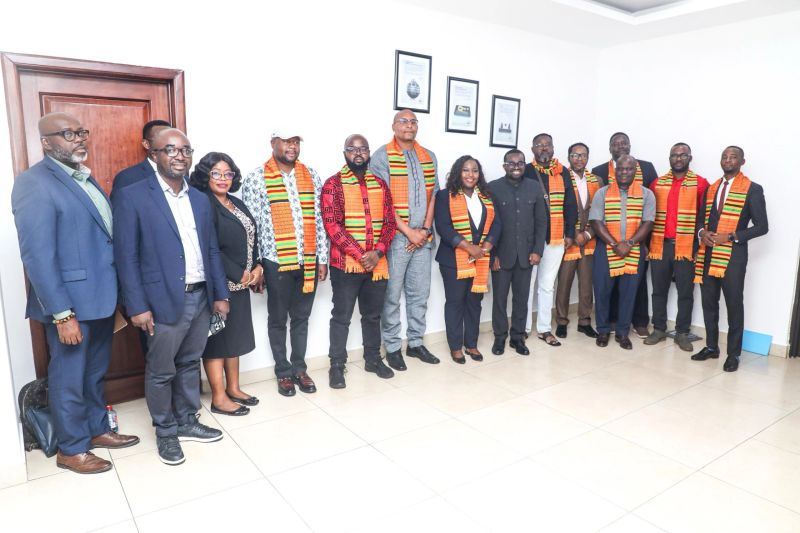On Wednesday, a high-level delegation of 11 representatives from the Malawi Communications Regulatory Authority (MACRA) was received by the National Communications Authority (NCA) at the NCA Tower.
The delegation travelled to Ghana under the direction of Daud Suleman, Director General of MACRA, in order to examine the technical architecture of the NCA’s Broadcasting Monitoring Centre (BMC) in preparation for the establishment of a comparable facility in Malawi.
Read also: Tano Digital wins Top Cloud Performance Award at SAP Africa Partner Summit 2025
Malawi to leverage Ghana’s BMC to combat misinformation, disinformation
Their main goal was to build Malawi’s digital regulatory infrastructure by utilising the BMC’s ability to fight disinformation and misinformation.
Rev. Ing. Edmund Yirenkyi Fianko, the Acting Director General of NCA, welcomed the group and said the Authority was proud to support MACRA’s efforts to build its own Broadcasting Monitoring Centre (BMC).
He emphasised that since its establishment, Ghana’s BMC has undergone extensive testing, constant upgrades, and improvement, guaranteeing its efficacy.
The BMC now has fingerprint intelligence technology, which improves its capacity to perform effective data searches and analysis, Rev. Fianko added.
He praised the team for choosing Ghana as a model, highlighted the value of information sharing, and conveyed the hope that, once their system is fully operational, Ghana will also have the chance to learn from Malawi’s innovations.
Boosting Malawi’s digital infrastructure amid low internet penetration rate
Speaking at the gathering was Dauda Suleman, Director General of MACRA.
Dauda emphasised the necessity of bolstering Malawi’s digital infrastructure, recognising the nation’s expanding digital scene while also pointing out important obstacles, such as low internet penetration (36.9 percent) and a young population (average age: 17 years old) that is highly dependent on digital platforms.
In order to establish a secure and well-regulated digital environment, he pointed out that MACRA is aggressively enacting regulatory changes and embracing new technology.
Members of the Malawi Parliament, as well as representatives from the ICT Association of Malawi, civil society, and the Malawian media, were all part of the delegation.
The team got a firsthand look at the NCA’s operations and technological innovations by touring the BMC during their visit.
Read also: NEC XON, Skywire bring high-speed Internet to remote South African communities
MACRA’s plans to combat misinformation, disinformation and oppositions
Last month, The Malawi Communications Regulatory Authority (MACRA) showed its intention to award a contract to purchase an integrated system to monitor misinformation and disinformation patterns in Malawi to Hashcom Ghana Ltd, which is expected to cost $1.5 million (about K2.6 billion).
The award of the contract is for the supply, delivery, installation, commissioning and testing of integrated systems to track misinformation and disinformation trends in the country.
This moves has been subjected to serious scrutiny from Non-governmental organisations (NGOs), Youth and Society (YAS) and the Centre for Human Research and Rehabilitation (CHRR).
According to the letter written by the group to MACRA on January 17, the CSO’s believes that the decision to purchase a machine that will combat misinformation and disinformation on digital platforms is insensitive, considering the country’s economic downturn.
The letter, which was co-signed by YAS Executive Director Charles Kajoloweka and CHRR Executive Director Michael Kaiyatsa, read in part, “Macra’s procurement of a system that enables mass communication surveillance raises legitimate fears about the potential for abuse. It is imperative to ensure that any measures to address misinformation and disinformation do not come at the cost of fundamental rights and freedoms, namely, the public’s right to privacy, freedom of expression, and access to information.”
In an open letter to MACRA on January 27, Net Rights coalition, a pan-African coalition of Internet freedom activists who share knowledge and experiences to combat digital rights threats, stated in part, “The signaled intention of MACRA to procure surveillance technologies targeting the mapping of misinformation and disinformation trends implies targeted mass communications surveillance, a threat to freedom of expression, access to information and the right to privacy.”
The statement adds, “we note that such a tool would potentially seek, among others, to monitor individual and group social media accounts as well classifying target groups for ease of digital surveillance such as human rights defenders and the media.”
George Chaponda, the leader of the opposition in parliament, also demanded that the system’s procurement be immediately halted.
He stated that until Parliament determines if the procurement procedure is necessary and in line with national interests, it should be put on hold.
However, in a media briefing last month, MACRA’s Director-General Daud Suleman defended the purchase by claiming it will aid in the fight against false information and fake news.
According to him, the system will assist boost confidence in the digital sphere rather than being used for digital surveillance of private chats or social media regulation as is being proposed.
















